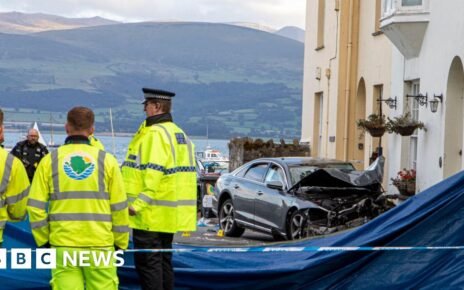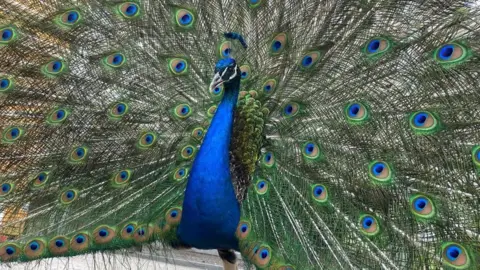 Peacocks In Pittencrieff Park
Peacocks In Pittencrieff ParkThe peacocks of Dunfermline have officially been granted the Freedom of the City after laying claim to its parks and streets for over a century.
The brightly coloured birds were introduced to Pittencrieff Park in 1905 when philanthropist Andrew Carnegie asked his friend Henry Beveridge to bring them back to his hometown from India.
Beveridge is believed to have returned with two breeding pairs – and there have been peacocks in the Fife city ever since.
Dunfermline was granted city status 2022- and the peacocks are the first residents to officially receive the honour.
 Carlyn Cane
Carlyn CaneWhen they first arrived in Dunfermline the birds were known for regularly stopping traffic on the High Street and were even spotted wandering about nearby villages.
But without anyone assigned to look after them, they had a precarious existence.
That changed nearly 10 years ago when Suzi Ross was asked by her brother, who was park manager at the time, to keep an eye on them.
A new sanctuary was opened in 2016 as part of a wider £1.6m project to restore Pittencrieff Park to its former glory and the population has grown ever since.
Peacocks in Pittencrieff Park is staffed by volunteers and funded by public donations, and Suzi now has the grand job title of “lead peafowl warden”.
Currently there are 21 peafowl – a term that encompasses both male and female birds – including eight peachicks, four of which hatched earlier this month.
It costs £150 a week to feed them all.
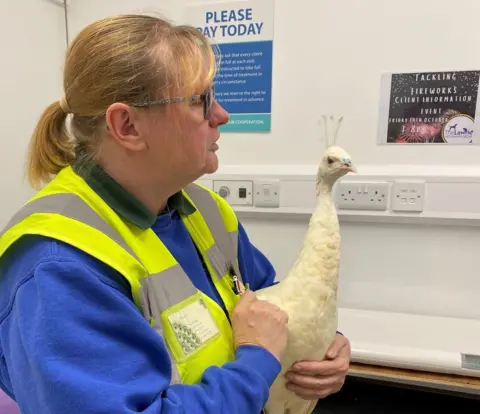 Carolyn Cane
Carolyn CaneFreedom of the City is an ancient honour bestowed by city authorities – but it may not make much practical difference to the peacocks who are already free to go pretty much where they please during the day.
“We do have two birds in particular, Andrew and Hamish, who do like to go wandering,” senior aviary team member Carlyn Cane told BBC Scotland News.
“They do occasionally wander onto the road and stop traffic. But all we ask is just for people to be very aware when that happens and let us know.”
Most of the birds choose to stay close to the park. They return at night to the sanctuary to be fed before they fly off to roost in the park’s trees.
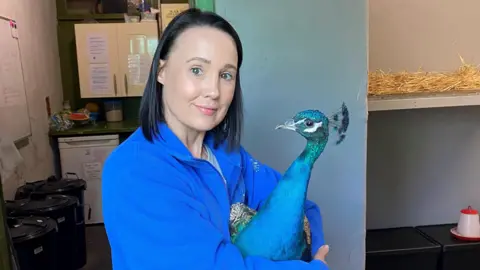
Carlyn began working with the birds as a volunteer four years ago. “I’m there almost daily and it’s a bit mad but we love it and we wouldn’t change a thing.
“They’re so synonymous with Dunfermline and everybody here knows about them.
“They’re just a great symbol and they’ve been in the park for such a long time, everybody’s got memories of them.”
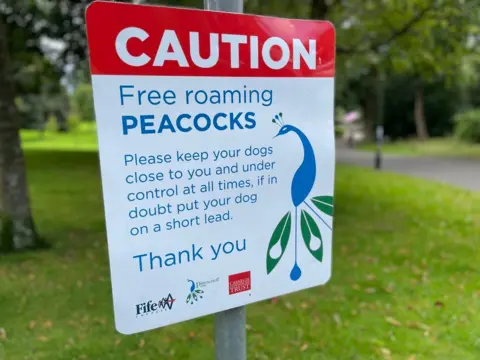
Two years ago the community was shocked by a break-in at the aviary involving two young boys, aged 11 and 13, during which a peacock called Malcolm was killed.
Another peacock called Louis was seriously injured during the incident.
“Suzi and I looked after Louis day and night for six solid weeks to keep him alive,” said Carolyn.
It remains an isolated incident, but other threats include dogs which are often walked in the park.
“We’ve had incidents with dogs but generally 90% of visitors to the park are aware the birds are there and control their dogs,” said Carolyn.
“But the birds can get such a fright that they just fly, and they will fly into windows or walls just trying to get away and that’s how they die. And it’s awful.”
The student nurse even adopted one peahen who was disabled and could not survive alone.
 Carlyn Cane
Carlyn Cane“She was diagnosed with a form of dwarfism and her legs did not fully develop so she was on medication twice a day,” she said. “She was my baby.
“I had to arrange babysitters when I was on placement since she needed constant watching. However in September she slipped a tendon and that was devastating.
“It happened very fast and we took her to the vet and he gave me the weekend to say goodbye to her. Everybody was heartbroken when she died – she was just 16 months old.”
Wild peafowl can live as long as 25 years. The male peacocks have the extravagant plumage to attract mates, while the females are a plainer colour.
Carlyn welcomed the Freedom of the City honour for the birds, adding: “They have a way of speaking to your heart and curling up and staying there.
“Once you fall in love with them, there’s absolutely nothing you can do.
“It’s good that they’ve got the recognition of just how important they are to the people of Dunfermline.”
Fife provost Jim Leishman – former manager of local football team Dunfermline Athletic – said the birds were “very important” to the city.
He added: “By awarding them Freedom of the City we’re recognising their valuable contribution and encouraging their presence in and around the city.”




